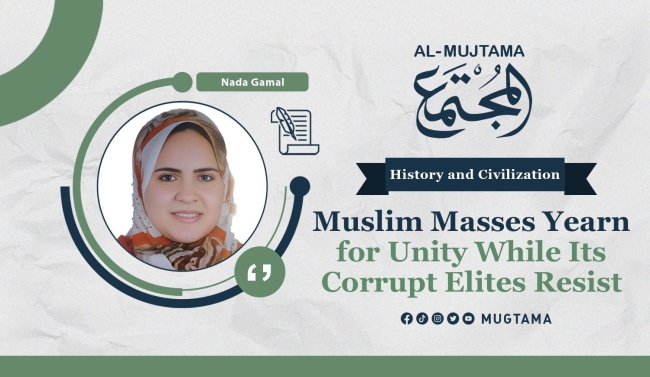Muslim Masses Yearn for Unity While Its Corrupt Elites Resist Featured
The return of Islamic unity has never faded from the dreams of Muslims since the fall, or rather, the overthrow, of their last caliphate, the Ottoman Empire. Jamal al-Din al-Afghani called for Islamic unity as a necessary response to Western colonialism, as did Muhammad Abduh. It’s solely for this purpose that Hassan al-Banna founded the Muslim Brotherhood.
In India, which was not politically part of the Ottoman Islamic Caliphate, prominent Muslim thinkers like Abul Hasan Hasani Nadwi and Abul A'la Maududi advocated for unity. From Iran, the notable Islamic thinker Ali Shariati called for Islamic unity, envisioning a single Islamic Ummah transcending sectarian differences.
All these thinkers did not delve into the specific form of unity—whether it be a universal caliphate, a federal union, a confederation, or just an economic alliance. Their focus was on cohesion and consolidation only, as opposed to fragmentation and disarray.
Efforts to Unify Muslims
Muslims efforts to find any form of unity have not stopped since the overthrow of the Ottoman Caliphate, the last symbol of unity. History records numerous attempts, conferences, and organizations formed with the aim of achieving this unity.
Among these notable attempts are:
- Islamic Caliphate Conference (Cairo, 1926): Initiated by King Fuad I of Egypt and attended by representatives from 22 Islamic countries, this conference did not yield tangible results.
- First Islamic Conference (1926): Held in Makkah with the participation of 22 Islamic countries. The conference aimed to discuss issues facing the Islamic world, such as Western colonialism and missionary movements.
- Jerusalem Conference (1931): Convened to discuss the Palestinian Cause.
- Arab League (1945): Established as a regional organization comprising Arab countries, with significant support from Britain during its founding in 1945. This indicates a desire to create an institution capable of influencing Arab nations.
- Cairo Conference (1954): Included seven Arab countries and discussed issues related to Arab and Islamic unity.
- Organization of Islamic Cooperation (1969): Formed after the burning of the Al-Aqsa Mosque, it includes 57 Islamic countries and aims to enhance cooperation in various fields among its member states.
- Group of Eight (1997): An international organization founded by eight Islamic countries, advocated by Necmettin Erbakan, the late Turkish Prime Minister.
We will now focus on two specific attempts: the Organization of Islamic Cooperation and the Group of Eight.
Firstly, the Organization of Islamic Cooperation (OIC):
The Organization of the Islamic Conference, now known as the Organization of Islamic Cooperation (OIC), was established on September 25, 1969, in the Moroccan capital, Rabat. It was founded following the convening of the first conference of Islamic leaders in response to the burning of the blessed Al-Aqsa Mosque by Zionists on August 21, 1969. This incident provoked anger and resentment across the Islamic world.
Unrealized Goals
The organization aims to enhance solidarity and cooperation among member states in political, economic, social, cultural, and scientific fields. Additionally, it seeks to protect Islamic holy sites and support the struggles of all Islamic nations in maintaining their dignity, independence, and national rights.
But what has the organization achieved so far? What progress has it made in combating ethnic cleansing and genocide against Palestinian Muslims in Gaza or elsewhere? And what has it achieved in the quest to liberate the Al-Aqsa Mosque, despite it being one of the key reasons for its establishment?!!
Absence of Will and Mechanism
The reality is that the organization convenes, issues statements, and makes noise, but takes no action whatsoever. The reason behind this is the absence of a will among its members, resulting in the lack of an effective mechanism for implementing the organization's decisions, if there were any to begin with!
Secondly: The Group of Eight (G8):
Necmettin Erbakan became the Prime Minister of Turkey for one year, from June 28, 1996, to June 30, 1997. During this period, he achieved notable accomplishments, one of which the establishment of the Group of Eight.
The G8 is an international organization founded in 1997 by eight developing Islamic nations: Turkey, Egypt, Nigeria, Pakistan, Indonesia, Iran, Malaysia, and Bangladesh.
This group represents a significant population and economic bloc, covering approximately 14.7 million square kilometers and accounting for about 10% of the world's land area. The collective population of the G8 is around 1.1 billion people, or roughly 14% of the global population. The total size of their economies amounts to $3.8 trillion.
The organization's goals include enhancing economic, trade, and scientific cooperation, as well as supporting Islamic causes in international forums.
The Organization Achievements
The organization stands out as a rare attempt with tangible impacts on the ground, achieving notable accomplishments despite facing obstacles and a lack of enthusiasm from certain authoritarian governing systems. Some of its achievements include:
- Signing the Preferential Trade Agreement among member countries in 1998.
- Establishing the Islamic Cooperation for Development Fund in 2005.
- Convening numerous summits and conferences addressing various issues.
Subordination, Corruption, and Despotism
From this brief overview of Muslim attempts to achieve a form of unity, it becomes evident that these attempts have not ceased. However, they are often timid and not serious. Moreover, most regimes show little enthusiasm for unity, rarely initiating serious efforts for consolidation and cohesion. What are the obstacles hindering Islamic unity?
Many Muslim countries are still governed by regimes that lack vision and have little control over their own affairs. These regimes solely know tyranny, only approaching those who are rotten and engage in corruption. This reality makes the unification of the Muslim Ummah a distant goal, unless these conditions and circumstances change.
-------------------------------------------------------------


